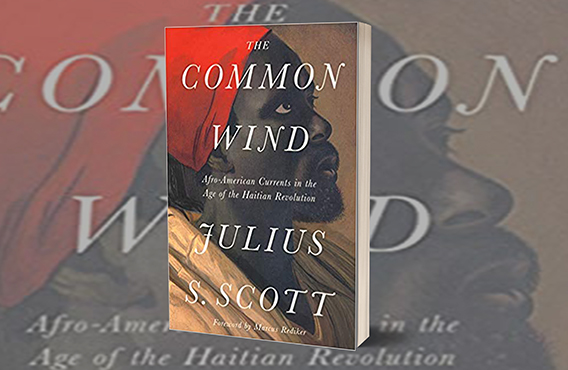Even when published in book form, academic dissertations rarely get much attention. But “The Common Wind: Afro-American Currents in the Age of the Haitian Revolution,” which earned Julius S. Scott Ph.D. ’86 his doctorate, is the rare exception. After its completion in 1987, “The Common Wind” attracted interest from a few publishers. But Scott was not prepared to undertake the revisions that publishers and he himself felt were necessary.
So, Scott went off to teach at the University of Michigan, and his dissertation went onto the shelf. Unlike most such works, however, “The Common Wind” didn’t stay there. Instead, it went on to become an underground history sensation based on handed-around photocopies and PDFs.
Titled after a Wordsworth sonnet about doomed Haitian revolutionary Toussaint L’Ouverture, “The Common Wind” is impeccably researched and written. It has gained a stellar reputation over the years, enough to be the subject of a 2008 conference at Michigan. Last year, Time magazine included the still-unpublished work in a list of “9 Books to Read for Black History Month.”
Finally, three decades after Scott finished “The Common Wind,” the book publisher Verso contacted Scott about putting it into print for real. Yet his initial impulse was to decline the offer.
“I was talking to them on the phone and saying, ‘No thank you,’ ” Scott recalls. “That’s when my partner asked me to put down the phone and said, ‘Look, your parents and other people in your family would be really proud to have this out. So why don’t you just go ahead?’ So, I said okay, reluctantly and with some skepticism. But I’m glad I did because it’s done well.”
Indeed, it has. Since its November 2018 publication, The Common Wind has earned plaudits, including the MAAH Stone Book Award—a $25,000 prize for “an exceptional adult nonfiction book written in a literary style.” Scott and his book were feted this year in February at Duke, with a conference bringing together graduate students from his time on campus.
“It has felt vindicating, although I never thought of it as a lesser thing because it hadn’t been published,” Scott says. “It was just this extraordinary thing that was kind of famous.”
A native Texan, Scott did his undergraduate studies at Brown University. Wanting to return to the South for graduate school, he came to Duke intending to study the history of the nineteenth-century South. But classes at Duke rekindled his long-held interest in Haiti enough for him to take on an unusual aspect of its history: tracking how information changed hands among slaves, sailors, and freed blacks during the 1791-1804 Haitian Revolution.
Peter H. Wood, Duke professor emeritus of history, served as Scott’s adviser. He admired his student's ambition in taking a leap of faith that enough information and documents were out there to support his research. It turned out there were, although it took a lot of time, work, and travel.
“To be a historian takes a combination of literary and imaginative skills and the ability to do difficult archival research with patience and determination. He needed to learn Portuguese for this, so he did. More than anyone I know, he set his sights high. Books this good don’t come along very often.”
Scott has endured a series of health problems since finishing "The Common Wind," losing both legs and most of his eyesight to Type 1 diabetes. He has to undergo regular dialysis treatments, which take up enough time that he can no longer teach. So, he is essentially retired at age sixty-four. But his one published book has had enough long-term impact, before and after publication, to stand as a major accomplishment in the field.
“I’ve been thinking about some things I’d like to do in adult education to maintain a teacher-student relationship because I enjoy that connection. I’ve got to figure it out," he says. “But people ask if I’m gonna do another book, I’m not sure that can happen. All this attention after so long was nice.”


Share your comments
Have an account?
Sign in to commentNo Account?
Email the editor